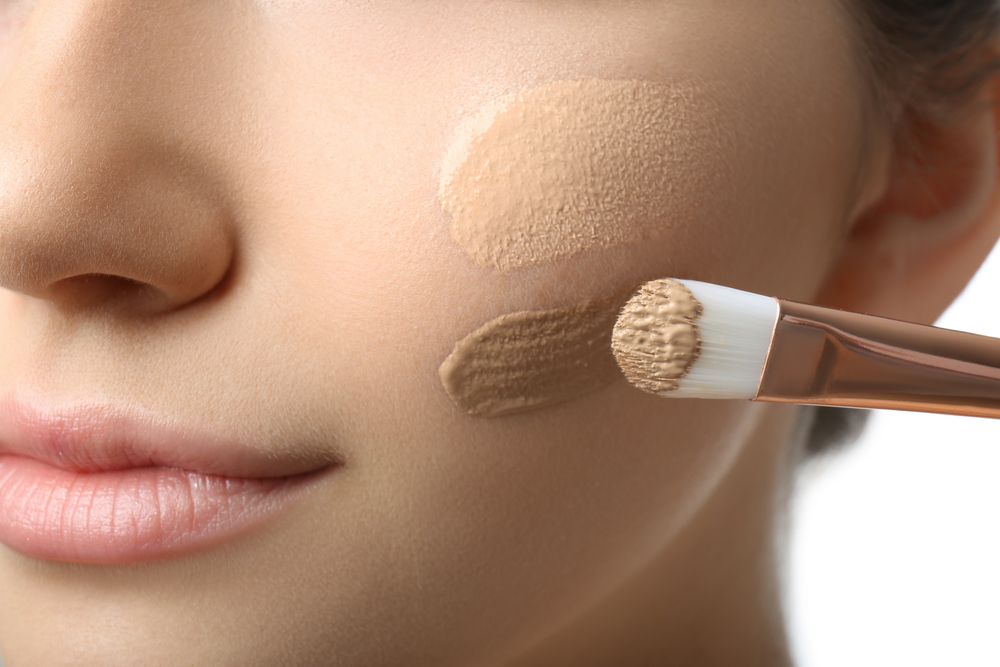- Psoriasis is a skin disorder that causes red, scaly patches and can make makeup difficult to apply.
- It’s best to opt for liquid-based products if you struggle with psoriasis since they tend to be more hydrating.
- Be sure to also practice a gentle routine to remove your makeup to avoid further irritation.
Psoriasis is a skin condition that can cause the skin to form into red, scaly patches. This condition commonly occurs on the trunk, knees, elbows and scalp, but can occasionally appear on the face. Applying makeup with psoriasis can be quite difficult since the patches tend to be raised, textured and discoloured.
If you’re struggling with psoriasis on your face, don’t be discouraged! There are plenty of tips and tricks available to make the process of applying makeup easy, effective and gentle enough that it won’t further irritate the skin. Follow along for our guide of tips and tricks when applying makeup with psoriasis.
What Is Psoriasis?
Psoriasis is a skin disorder that causes skin cells to multiply up to 10-times faster than normal and causes red, itchy scaly patches, according to WebMD. The patches most commonly appear on the knees, elbows, trunk and scalp.
Psoriasis is a long-term condition that tends to go through cycles. It can flare up for a few weeks or months, then subside or go into remission for periods of time as well. While there is no cure for psoriasis, there are treatments available to help manage symptoms.
 Shutterstock/NT_Studio
Shutterstock/NT_StudioSymptoms of Psoriasis
Psoriasis symptoms can vary depending on the type and severity you have been diagnosed with. The most common type of psoriasis is plaque psoriasis, which causes red plaques on the skin that are often covered with silver-colored scales. These plaques may be itchy and painful, and can sometimes crack and bleed.
Psoriasis patches can range from a few spots of light scaling to major plaques that cover large areas. Those with psoriasis may also notice thickened, pitted or ridged nails and/or swollen and stiff joints.
 Shutterstock/Rido
Shutterstock/RidoThings to Keep In Mind
If you struggle with psoriasis and are looking into selecting makeup products, there are a few things to keep in mind. First being, you should never apply makeup directly to raw, irritated skin or open lesions.
It’s also important to consider what your goals are. If you struggle with mild psoriasis, makeup may help mask some of the discolouration. It can’t mask skin texture, however, and may actually further emphasize any rough, scaly texture.
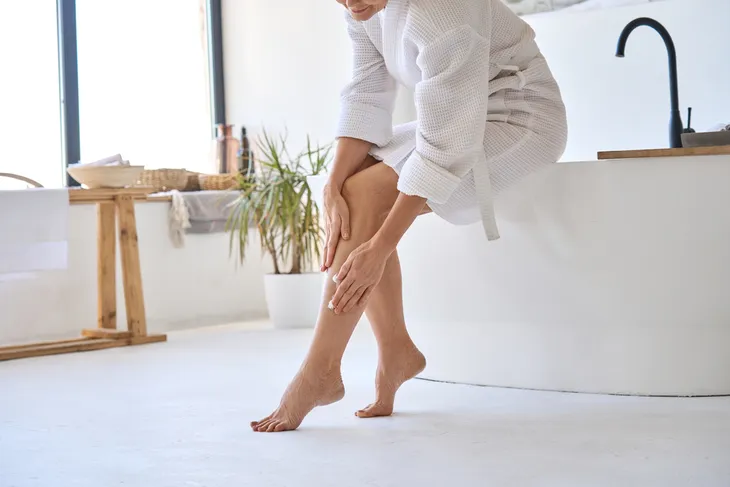 Shutterstock/insta_photos
Shutterstock/insta_photosFinding the Right Products
If you struggle with psoriasis, it’s important to look for the right products that will work well with your skin. One general rule of thumb is to always look for products that are non-drying and have moisturizing properties to them.
Look for products that have a cream or oil base since they tend to be more hydrating and moisturizing. This will ensure that the product will not further emphasize or irritate the psoriasis by drying out the area and causing flakiness.
 Shutterstock/GaudiLab
Shutterstock/GaudiLabIngredients to Avoid
Just as there are some key ingredients to look for when shopping for makeup with psoriasis, there are also some ingredients that experts deem best to avoid. Everyday Health suggests staying away from products that have glitter or sparkle since it can draw attention to texture and may irritate the skin.
Fragrances, dyes, essential oils and alcohol are other ingredients that should be avoided if you struggle with psoriasis since they are known to irritate and dry out the skin.
 Shutterstock/Orawan Pattarawimonchai
Shutterstock/Orawan PattarawimonchaiPrep Your Skin
Before starting your makeup routine, it’s important to prep your skin and give the makeup a solid base to sit on. Be sure to cleanse and moisturize the skin for a fresh, hydrated base. A rich moisturizer can help to treat dryness and soften psoriasis patches.
The morning may also be a good time to apply any topical treatment for your psoriasis prescribed from a doctor. It’s best to allow time for the treatment to sink into the skin before starting makeup. It’s also important to include an SPF in your skin prep routine.
 Shutterstock/popcorner
Shutterstock/popcornerReduce Scaling: Occlusion Therapy
If you plan to use makeup on areas of the body to cover psoriasis, it’s best to get the area as smooth as possible before application. One method that has proven to be effective to reduce scaling and smooth out the skin is occlusion therapy.
According to Everyday Health, this method is easiest to treat the arms and legs. Start by applying a generous layer of an emollient to hydrate and soften plaques, then wrap the treated areas with plastic wrap and leave overnight. Shower in the morning to wash away the scales.
 Shutterstock/Elnur
Shutterstock/ElnurReduce Scaling: Soaking
Another method to reduce scaling is through soaking, according to Everyday Health. You can do this by soaking your skin in a bath filled with warm water and bath oil. Be sure to opt for a fragrance-free bath oil to avoid any further irritation or dryness.
When you get out of the bath, gently exfoliate your skin with a towel to descale. Follow up with a gentle moisturizer to lock in hydration. Be sure to resist the urge to pick at stubborn patches, which can cause further irritation.
 Shutterstock/TashaSinchuk
Shutterstock/TashaSinchukLiquid vs. Powder
When it comes to choosing makeup products, specifically products for the face, many experts suggest opting for liquid or cream-based products if you struggle with psoriasis. Everyday Health explains that powder-based products tend to dry out the skin and may draw more attention to the area you’re trying to cover.
Cream or liquid products give a natural finish and allow for sheer and buildable coverage. This will give the skin a healthy, luminous quality and can help camouflage patches of dryness, texture or discolouration due to psoriasis.
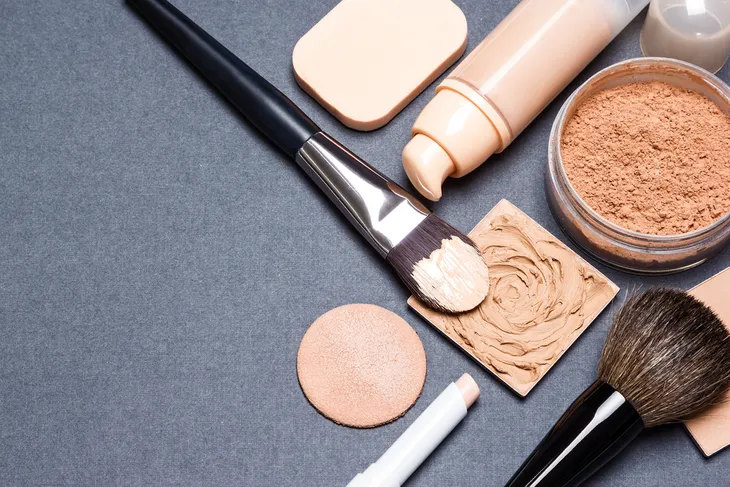 Shutterstock/JAYANNPO
Shutterstock/JAYANNPOFoundation Tips
Foundation is the base of your makeup routine so it’s important to chose the correct product and know how to apply it. Everyday Health suggests opting for a liquid foundation and applying it by tapping into the skin with a makeup sponge for the most natural finish. A sponge is gentle tool that works well to apply foundation and won’t irritate the skin.
Apply thin layers of the foundation until you’ve reached your optimal amount of coverage. Then go in and add extra product to any patches or discolouration on the skin. Be sure to buff the edges to allow for a seamless blend.
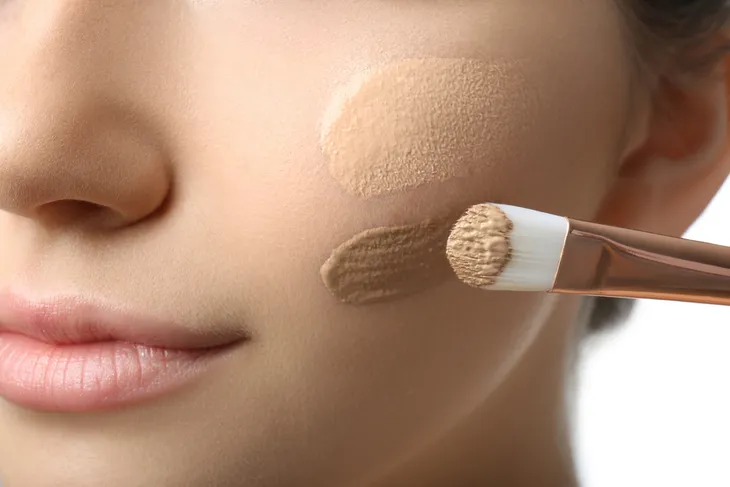 Shutterstock/New Africa
Shutterstock/New AfricaConcealer Tips
Concealer is another key product when it comes to applying makeup with psoriasis. Experts suggest applying foundation first, and focussing concealer on areas that you want even further coverage. Concealer may be helpful to hide specific problematic lesions. Be sure to chose a concealer that’s highly pigmented and has a cream or liquid base for the best results.
Apply concealer using a similar method as foundation. It’s recommended to use a beauty sponge or your fingers for the most gentle method of application. Be sure to buff the edges of the concealer so the product blends seamlessly with your skin and foundation.
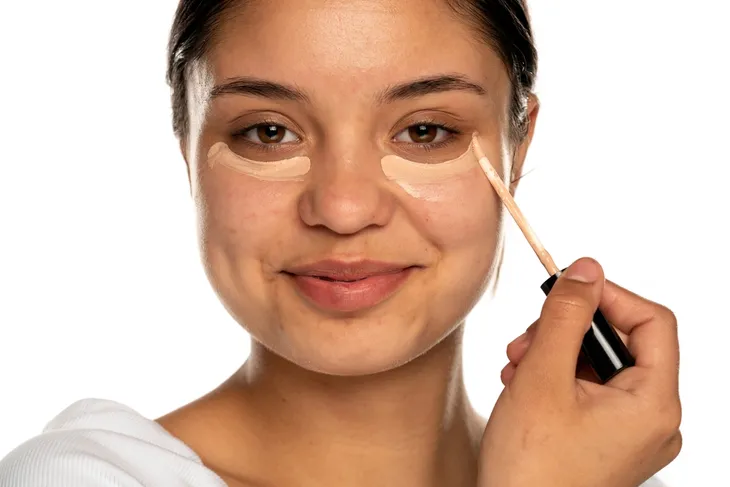 Shutterstock/Vladimir Gjorgiev
Shutterstock/Vladimir GjorgievMakeup Removal
While it’s important to know how to be gentle and strategic with how you apply your makeup with psoriasis, it’s also crucial to know how to properly remove your makeup without causing irritation. Be sure to opt for a hydrating cleanser and massage the product gently onto the skin to loosen makeup and debris.
Allure explains that you could also incorporate alpha- and beta-hydroxy acids into your cleansing routine to help smooth out the skin and gently remove any scaly, dry areas.
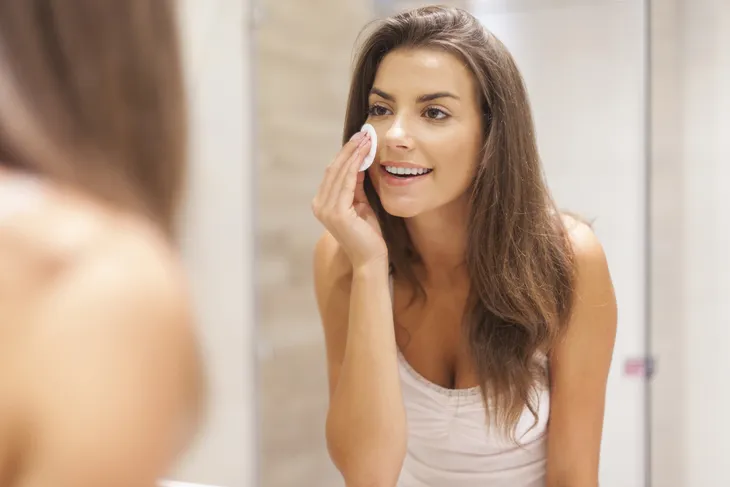 Shutterstock/gpointstudio
Shutterstock/gpointstudio